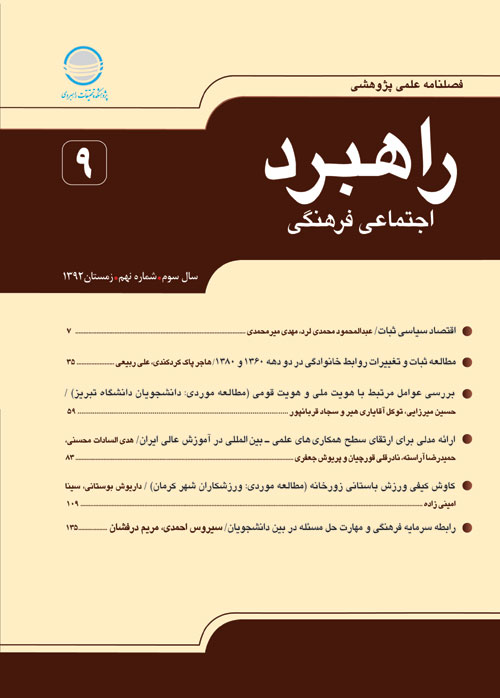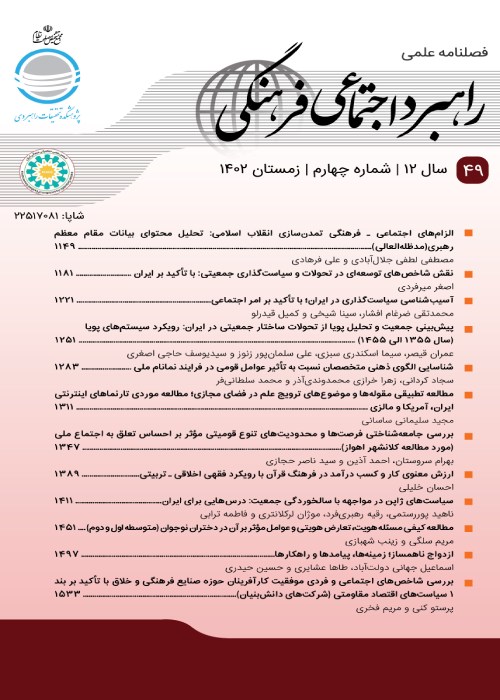فهرست مطالب

فصلنامه راهبرد اجتماعی فرهنگی
پیاپی 9 (زمستان 1392)
- تاریخ انتشار: 1392/11/14
- تعداد عناوین: 6
-
-
صفحه 7در این مقاله سعی شده است علت های اقتصادی ثبات سیاسی با استفاده از روش تحلیل مقایسه ای کیفی فازی شناسایی شود. با توجه به اینکه در علوم اجتماعی از یک سو، اغلب تئوری ها جنبه تعلیلی دارند و به دنبال علت پدیده های اجتماعی هستند و از سوی دیگر شناسایی علت پدیده های اجتماعی از طریق آزمون های همبستگی آماری میسر نیست، برای غلبه بر این مشکل روش تحلیل مقایسه ای کیفی فازی برای شناسایی علت پدیده های اجتماعی در سال 2008 مطرح شد. در این روش که ریشه های کیفی دارد، علت لازم و علت کافی برای بروز پدیده اجتماعی آزمون می شود. بدین منظور ابتدا طیف گسترده ای از متغیرهای اقتصادی موثر بر ثبات سیاسی از تئوری های علوم اجتماعی احصا شده، سپس این متغیرها در یک مطالعه بین کشوری با مقایسه 183 کشور جهان تحت آزمون تجربی قرار گرفته و علت های اقتصادی ثبات سیاسی شناسایی شد. نتایج حاصل از این پژوهش نشان داد: بین 28 متغیر اقتصادی، چهار متغیر جهانی شدن اقتصادی، رشد اقتصادی متوازن، کیفیت مقررات تجاری و سهولت انجام کسب و کار علت های ایجاد ثبات سیاسی هستند.
کلیدواژگان: ثبات سیاسی، اقتصاد سیاسی، تحلیل تجربی، علت لازم و علت کافی -
صفحه 35این مقاله به مطالعه ثبات و تغییرات روابط خانوادگی در سطح همسران، طی دو دهه 1360 و 1380 می پردازد. برای نیل به این هدف از روش مصاحبه نیمه ساخت یافته، عمیق و نیز مصاحبه گروهی و تجزیه و تحلیل کیفی یافته ها استفاده شده است. در این تحقیق مفروضات موجود در نظریه «رابطه ناب گیدنز» انتخاب و پیاده سازی شد و در ادامه هم از سوالات مواجهه ای استفاده شده است. نتایج تحقیق حاکی از وجود نوعی تفاوت ظریف، اما قابل توجه در میان این دو نسل از روابط زناشویی در ابعادی همچون نگرش جنسیتی، خشونت خانگی، عوامل بیرونی، خودمختاری و شیوه همسرگزینی است. با وجود استقبال مصاحبه شوندگان از ارزش هایی همچون آزادی بیشتر و فردگرایی، آزادی های جنسی بازنمایی شده در ماهواره و رسانه های خارجی مورد پذیرش آنان نبوده است.
کلیدواژگان: روابط خانوادگی، تفاوت بین نسلی، نظریه رابطه ناب گیدنز، تاثیرات رسانه ای و تحلیل کیفی -
صفحه 59در این پژوهش به مطالعه برخی از مهم ترین متغیرهای موثر بر هویت ملی و قومی پرداخته شده است. پژوهش حاضر با روش پیمایشی و در بین دانشجویان آذری ترک زبان دانشگاه تبریز در سال تحصیلی 91-1390 انجام شده و نمونه پژوهش 268 نفر است. در این پژوهش از پرسشنامه محقق ساخته و مقیاس های استاندارد، جهت سنجش متغیرهای تحقیق استفاده شد و اطلاعات به دست آمده از طریق نرم افزار spss مورد تحلیل قرار گرفت. نتایج کلی نشان داد: رابطه بین هویت ملی با عزت نفس و احساس محرومیت معنادار و منفی است و با متغیر زبان مادری رابطه معنادار نبوده است، در عین حال دانشجویان طبقه پایین از هویت ملی پایین تری نسبت به سایر دانشجویان برخوردار بوده اند. در خصوص هویت قومی نیز روابط معنادار و مثبت بوده، اما هویت قومی دانشجویان طبقات مختلف با هم متفاوت نبوده است.
کلیدواژگان: هویت ملی، هویت قومی، عزت نفس، احساس محرومیت، زبان مادری و پایگاه اجتماعی -
صفحه 83هدف مقاله حاضر، شناسایی ابعاد و مولفه های همکاری های علمی بین المللی به منظور ارائه مدلی برای ارتقای آن در آموزش عالی ایران است. این تحقیق توصیفی از نوع پیمایشی است. جامعه آماری تحقیق مشتمل بر اعضای هیئت علمی دانشگاه های برتر حوزه همکاری های علمی بین المللی است. 342 نفر از آنها با استفاده از فرمول کوکران، از طریق روش نمونه گیری طبقه ای نسبتی انتخاب شده اند. ابزار اصلی تحقیق برای جمع آوری داده ها، پرسشنامه محقق ساخته بوده است. نتایج نشان داد: همکاری های علمی بین المللی دارای 6 بعد و 36 مولفه است. مدل نهایی تحقیق بر اساس ابعاد و مولفه های شناسایی شده همکاری های علمی بین المللی، دارای 6 بعد فرهنگی، پژوهشی، آموزشی، اجرایی، پرسنلی و رفاهی بوده است. مدل ارائه شده از نظر محققان با اطمینان 95 درصد مورد تایید قرار گرفته است.
کلیدواژگان: آموزش عالی، بین المللی شدن، جهانی شدن، همکاری های علمی، بین المللی و مدل -
صفحه 109هدف این مقاله، بررسی کیفی ورزش زورخانه با رویکرد امیک و تفسیری است. ده نفر از باستانی کاران زورخانه های شهر کرمان در این تحقیق مشارکت کردند. تحلیل داده ها با بهره گیری روش شناسی کیفی نظریه زمینه ای، 9 مقوله و یک مقوله هسته به دست داد. به طور کلی تحلیل یافته ها نشان داد: نفوذ ارزش ها و قوانین ورزش های نوین با ارزش های سنتی زورخانه، مانند عیاری، جوانمردی و پهلوانی در تقابل بوده، آنها را سست نموده و به تبع آن، کارکردهای مثبت زورخانه در جامعه تنزل یافته است، به نحوی که در حال تبدیل از یک نهاد اجتماعی ورزشی به یک نهاد صرفا ورزشی است. از آنجا که ماهیت زورخانه با نظام ورزش مدرن چندان سازگار نیست، نیاز جدی به تجدید نظر در سیاست گذاری در مدیریت این نهاد اجتماعی ضروری است.
کلیدواژگان: زورخانه، باستانی کاری، عیاری، ارزش های جدید، قهرمانی و پهلوانی -
صفحه 135هدف اساسی مقاله حاضر، بررسی رابطه سرمایه فرهنگی و مهارت حل مسئله در بین دانشجویان است. پژوهش حاضر از نوع همبستگی و مبتنی بر تحلیل ماتریس کواریانس است. جامعه آماری، دانشجویان دانشگاه یاسوج هستند که 357 نفر به عنوان نمونه تعیین و با استفاده از روش نمونه گیری تصادفی چندمرحله ای خوشه ایانتخاب شدند. ابزار سنجش مهارت حل مسئله، مقیاس حل مسئله اجتماعی درزیلا و همکاران (SPSI) و ابزار سنجش سرمایه فرهنگی، مقیاس سرمایه فرهنگی خدادادی و نطنزی (CCS) است. بر اساس یافته های تحقیق، رابطه مثبت و معناداری بین سرمایه فرهنگی و مهارت حل مسئله وجود دارد و طی آن، سرمایه فرهنگی قادر است 28 درصد از واریانس مهارت حل مسئله را تبیین کند. بنابراین با افزایش سرمایه گذاری فرهنگی در دانشگاه ها و افزایش سرمایه فرهنگی دانشجویان، می توان مهارت حل مسئله به عنوان یکی از نیازهای اساسی آنان را ارتقا بخشید.
کلیدواژگان: سرمایه فرهنگی، مهارت حل مسئله، حل مسئله اجتماعی، دانشجویان و دانشگاه یاسوج
-
Page 7In this article, the economic causes of political stability have been identified by fuzzy sets qualitative comparative analysis. To achieve this goal, a wide range of economic variables affecting political stability was derived from the theories of social science. Then, these variables were tested experimentally with compare the world's 183 countries. The results showed that four variables are the cause of political stability: economic globalization, balance economic growth, regulatory quality and ease of doing business.Keywords: political stability, political economy, empirical analysis, necessary cause, sufficient cause
-
Page 35This paper studies the stability and changes in family relationships (at the level of marital status) over two decades of 1980s and 2000s. For this, in-depth interview and focus group interview have been used. Due to two decades changes in the society of Iran and doing united analysis on the changes in marital relations, existing assumptions in the theory of "pure relationships" of Giddens have been selected to be questioned. Results indicated a subtle but significant difference between the two generations of marital relations in dimensions such as sexual attitudes, domestic violence, external factors, self-determination and mate selection manner. Despite welcoming the values like freedom and individualization, interviewees have not accepted unrestrained sexual representation in the satellite and foreigner media.Keywords: family relations, generational differences, pure relations theory of Giddens, media influence, qualitative analysis
-
Page 59In this study, some of the most important factors associated with the national identity and ethnic identity has been paid. The research method is survey and 268 Azari students were chosen from Tabriz University in the year 2012.The researcher made and Standard Questionnaires were used to gather needed data and SPSS is used to analyze them. Results showed that the relationship between national identity and ethnic identity is positive and significant. But the relationship between self-esteem and sense of deprivation with national identity is negative and significant. It also became clear that national identity is not a significant relationship with the native language. However, the low- class students had weaker national identity than others. About ethnic identity results showed that the relationship with self-esteem, sense of deprivation and native language are significant and positive also there isnt different between lower- class students with others students.Keywords: national identity, ethnic identity, sense of deprivation, self, esteem, native language, social base
-
Page 83The aim of this article was to identify the dimensions and components of international scientific cooperation in order to design a model for the promotion of international scientific cooperation in Iran's higher education system. This study is a descriptive survey. The study population consisted of faculty members of the University's top academic staff of International cooperation Programs. Samples of 342 were selected through stratified random sampling. Main instrument for collecting data was a questionnaire. The results showed international scientific cooperation have 6 dimensions and 36 components. Last model is based on identifying different dimensions of international scientific cooperation, including six dimensions: cultural dimension, research, educational, the administrative, then personnel and facilities. This Model in regard of researchers, with 95% has been confirmed.Keywords: higher education, internationalization, globalization international scientific cooperation, model
-
Page 109This research aims to study the sport of Zoorkhaneh by the interpretive and emic approach. Ten Kermanian ancient athletes participated at the study. Data were analyzed by grounded theory methodology and culminated in nine categories and one core category. Generally finding indicated that influence of values and laws of modern sports is in contradiction with and deteriorate traditional values of Zoorkhaneh such as vagrancy, chivalry and epic and consequently positive functions of Zoorkhaneh declined in society so that is changing to a pure athletic institution. Since inconsistency of the identity of Zoorkhaneh with the system of new sports, it is necessary to review the management policies of this social institution.Keywords: Zoorkhaneh, vagrancy, new values, heroic, epic
-
Page 135The main purpose of this study is to investigate relationship between cultural capital and problem solving skill among students. The study is a correlational method based on analysis of covariance matrix. The population is the students of Yasouj University that 357 cases were selected using random multi-stage cluster sampling method. Research instrument of problem solving skill is social problem solving inventory (SPSI) and the research instrument of cultural capital is cultural capital scale (CCS).Based on the findings, there is a significant positive relationship between cultural capital and problem solving skill and cultural capital is able to explain 28% of variance of problem solving skill. So, increasing cultural investment on universities can increases the problem solving skill of the students as a basic need of them.Keywords: cultural capital, problem solving skill, social problem solving, students, Yasouj University


